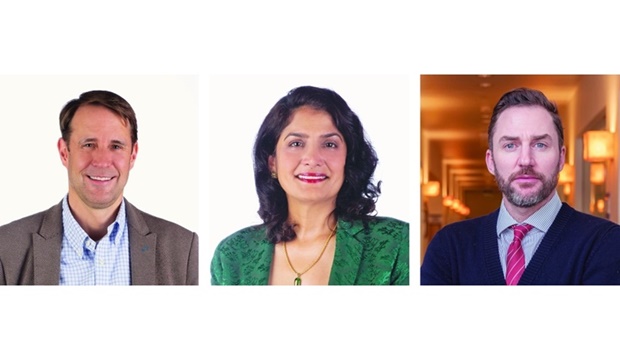Mega sporting events have placed a spotlight on the recruitment and naturalisation of top foreign athletes, a practice that is making national dreams come true, but also stirring public debate around sports and national identity.
To explore these critical issues, Qatar Foundation (QF) partner Georgetown University in Qatar (GU-Q) is assembling a panel of scholars on a public webinar on February 2 at 6pm, titled 'Who belongs to a country? National representation and identity at the FIFA World Cup 2022'.
The lecture is a part of the “Building a Legacy: Qatar FIFA World Cup 2022” research initiative at the GU-Q’s Centre for International and Regional Studies (CIRS), examining sport and the social, political and economic development of Qatar and the region.
Centering on Qatar's role in shaping the global conversation around sports and society, the webinar will cover a range of topics, including the reasons athletes switch nationalities and the citizenship requirements set forth by international sporting federations such as FIFA.
They will also explore conceptions of ethnicity and civic nationalism, and the future of citizenship and residency laws in a globalised world.
Visiting associate professor Dr Danyel Reiche, who is leading the CIRS research initiative, explained: “Nationality is a key issue in international sports. In some people’s perceptions, there may always be a hierarchy of ‘real’ above ‘fake’ national representatives.”
Highlighting the diversity of identities in elite sports where players often play for different countries, he pointed to players on the French team that won the 2018 World Cup and the Qatar team that won the 2019 AFC Asian Championship.
Many of these players are of immigrant ancestry, themselves immigrants, or the children of immigrants.
“Our panel discussion will show that there is no longer anything like a ‘pure’ national team, regardless of the respective country,” added Dr Reiche.
Panelist Zahra Babar, associate director for research at the CIRS, will discuss the complexity of immigration categories.
“Do migrant athletes fall into the category of ‘elite migrants’, those endowed with skills and resources at heightened levels that enable them to surmount barriers to international mobility? Or should we instead think of them as ‘sports labour migrants’?” she asked.
GU-Q associate professor Edward Kolla, who has an upcoming book on the history of the modern passport, will discuss football teams as the focus of discussions on national diversity and international representation.
Noting that laws and international authorities are the final arbiters of who can and cannot play in a tournament or on a team, he said that national representation includes public acceptance.
“The symbolism of when that is granted is often focused on a passport, or a national team jersey,” Kolla added.
Panelists on the webinar will include Gijs van Campenhout of the Netherlands’s Utrecht University, Peter Spiro of the US’s Temple University, and Ross Griffin of Qatar University.
Information on how to register to attend the webinar is available on the GU-Q website.
To explore these critical issues, Qatar Foundation (QF) partner Georgetown University in Qatar (GU-Q) is assembling a panel of scholars on a public webinar on February 2 at 6pm, titled 'Who belongs to a country? National representation and identity at the FIFA World Cup 2022'.
The lecture is a part of the “Building a Legacy: Qatar FIFA World Cup 2022” research initiative at the GU-Q’s Centre for International and Regional Studies (CIRS), examining sport and the social, political and economic development of Qatar and the region.
Centering on Qatar's role in shaping the global conversation around sports and society, the webinar will cover a range of topics, including the reasons athletes switch nationalities and the citizenship requirements set forth by international sporting federations such as FIFA.
They will also explore conceptions of ethnicity and civic nationalism, and the future of citizenship and residency laws in a globalised world.
Visiting associate professor Dr Danyel Reiche, who is leading the CIRS research initiative, explained: “Nationality is a key issue in international sports. In some people’s perceptions, there may always be a hierarchy of ‘real’ above ‘fake’ national representatives.”
Highlighting the diversity of identities in elite sports where players often play for different countries, he pointed to players on the French team that won the 2018 World Cup and the Qatar team that won the 2019 AFC Asian Championship.
Many of these players are of immigrant ancestry, themselves immigrants, or the children of immigrants.
“Our panel discussion will show that there is no longer anything like a ‘pure’ national team, regardless of the respective country,” added Dr Reiche.
Panelist Zahra Babar, associate director for research at the CIRS, will discuss the complexity of immigration categories.
“Do migrant athletes fall into the category of ‘elite migrants’, those endowed with skills and resources at heightened levels that enable them to surmount barriers to international mobility? Or should we instead think of them as ‘sports labour migrants’?” she asked.
GU-Q associate professor Edward Kolla, who has an upcoming book on the history of the modern passport, will discuss football teams as the focus of discussions on national diversity and international representation.
Noting that laws and international authorities are the final arbiters of who can and cannot play in a tournament or on a team, he said that national representation includes public acceptance.
“The symbolism of when that is granted is often focused on a passport, or a national team jersey,” Kolla added.
Panelists on the webinar will include Gijs van Campenhout of the Netherlands’s Utrecht University, Peter Spiro of the US’s Temple University, and Ross Griffin of Qatar University.
Information on how to register to attend the webinar is available on the GU-Q website.

